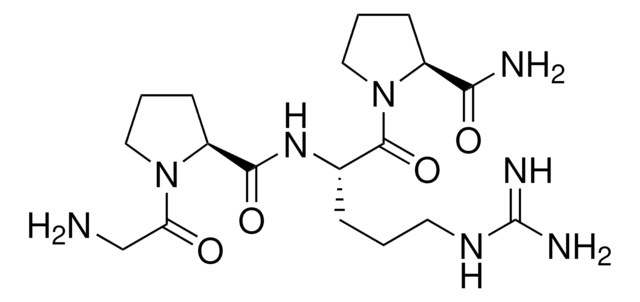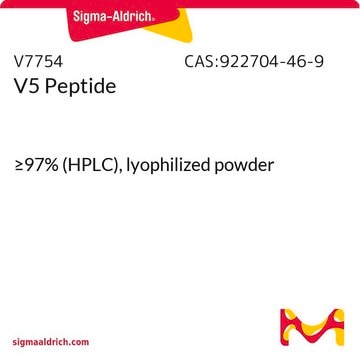G4541
Gly-Gly-His
≥98% (TLC)
Synonym(s):
Copper-binding peptide
Sign Into View Organizational & Contract Pricing
All Photos(1)
About This Item
Empirical Formula (Hill Notation):
C10H15N5O4
CAS Number:
Molecular Weight:
269.26
MDL number:
UNSPSC Code:
12352209
NACRES:
NA.26
Recommended Products
product name
Gly-Gly-His,
Assay
≥98% (TLC)
Quality Level
form
solid
color
white
storage temp.
−20°C
InChI
1S/C10H15N5O4/c11-2-8(16)13-4-9(17)15-7(10(18)19)1-6-3-12-5-14-6/h3,5,7H,1-2,4,11H2,(H,12,14)(H,13,16)(H,15,17)(H,18,19)
InChI key
PDAWDNVHMUKWJR-UHFFFAOYSA-N
Related Categories
Amino Acid Sequence
Gly-Gly-His
General description
Gly-Gly-His (GGH) tripeptide with carboxyl-terminal histidine residue is hydrophilic.
Application
Gly-Gly-His has been used:
- as a peptide test probe in the hydrophilic interaction liquid chromatography (HILIC) studies
- in the electrochemical modification of back-side contact transducers (BSC) electrodes in copper (Cu2+) sensing studies
- for the fabrication carbon nanotube electrode for detection of Cu2+ ions
Biochem/physiol Actions
Gly-Gly-His (GGH) tripeptide displays the affinity of copper (Cu2+) complexation. These complexes display good skin tolerance and may be useful in wound healing. GGH copper complexes are proposed to reduce tumor necrosis factor α (TNF-α)-based interleukin 6 (IL-6) secretion by in vivo studies with fibroblasts. GGH is used in comparative studies with other imidazole-containing peptides such as carnosine. An area of active application research involves the GGH binding of copper ions.
Storage Class Code
11 - Combustible Solids
WGK
WGK 3
Flash Point(F)
Not applicable
Flash Point(C)
Not applicable
Personal Protective Equipment
dust mask type N95 (US), Eyeshields, Gloves
Certificates of Analysis (COA)
Search for Certificates of Analysis (COA) by entering the products Lot/Batch Number. Lot and Batch Numbers can be found on a product’s label following the words ‘Lot’ or ‘Batch’.
Already Own This Product?
Find documentation for the products that you have recently purchased in the Document Library.
Customers Also Viewed
F Tacnet et al.
The Journal of physiology, 465, 57-72 (1993-06-01)
1. The purpose of the present work was to examine certain membrane transport mechanisms likely to carry zinc across the brush-border membrane of pig small intestine, isolated in a vesicular form. 2. In initial velocity conditions, saturation kinetics revealed a
Michael Gerlich et al.
Journal of mass spectrometry : JMS, 48(3), 291-298 (2013-03-16)
Mass spectrometry (MS) is an important analytical technique for the detection and identification of small compounds. The main bottleneck in the interpretation of metabolite profiling or screening experiments is the identification of unknown compounds from tandem mass spectra. Spectral libraries
K C Brown et al.
Biochemistry, 37(13), 4397-4406 (1998-04-29)
The Ni(II) complex of the tripeptide NH2-glycine-glycine-histidine-COOH (GGH) mediates efficient protein-protein cross-linking in the presence of oxidants such as oxone and monoperoxyphthalic acid (MMPP). Here we demonstrate that GGH fused to the amino terminus of a protein can still support
Electrochemical detection of copper using a Gly-Gly-His modified carbon nanotube biosensor
Flavel BS, et al.
Silicon, 3(4) (3)
Hirokazu Hamada et al.
Journal of inorganic biochemistry, 101(10), 1529-1536 (2007-08-21)
DNA fiber EPR was used to investigate the DNA binding stabilities and orientations of Cu(II).Gly-Gly-His-derived metallopeptides containing D- vs. L-amino acid substitutions in the first peptide position. This examination included studies of Cu(II).D-Arg-Gly-His and Cu(II).D-Lys-Gly-His for comparison to metallopeptides containing
Our team of scientists has experience in all areas of research including Life Science, Material Science, Chemical Synthesis, Chromatography, Analytical and many others.
Contact Technical Service










